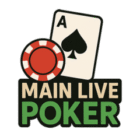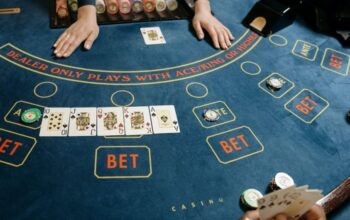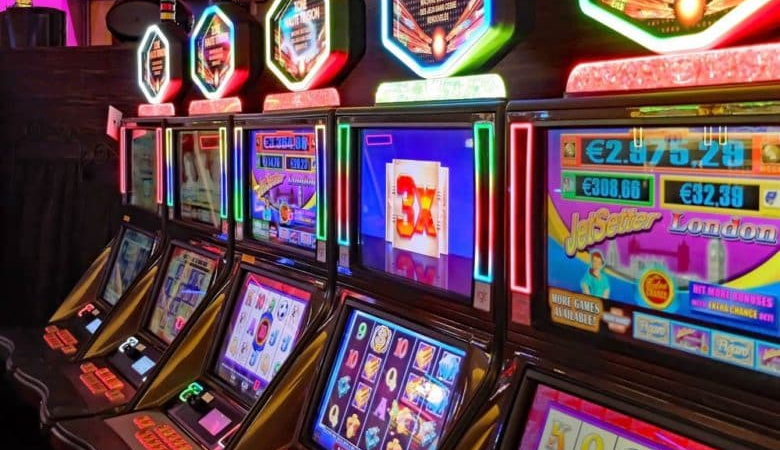Concerned about managing your time online, avoiding gambling addiction? You’re not alone. In this article, discover actionable tips for managing your time online avoiding gambling addiction and controlling your internet usage to steer clear of gambling risks. Recognize triggers, leverage digital tools, and build a healthier online routine to safeguard your well-being.
Table of Contents
Understanding Online Gambling Addiction
Recognizing Triggers for Online Gambling
Setting Time Limits for Internet Use
Creating a Structured Daily Routine
Incorporating Healthy Activities
Avoiding High-Risk Situations Online
Financial Management Strategies
Developing Long-Term Healthy Habits
What are common triggers for gambling addiction?
How can digital tools help manage online gambling?
Why is it important to have a structured daily routine?
What role do support groups play in recovery from gambling addiction?
How can positive reinforcement help in avoiding gambling?
Understanding Online Gambling Addiction

Gambling addiction, also known as pathological gambling or compulsive gambling, is characterized by an overpowering urge to gamble despite negative consequences (source: Casinosdownunder). Unlike substance addictions, it often lacks obvious physical signs, making it harder to detect and address. This hidden nature can lead to significant psychological distress, with conditions like anxiety or depression often increasing the risk. Those affected might find themselves preoccupied with gambling, increasing the time and money spent on these activities. This can lead to financial difficulties and even debt as individuals chase losses in an attempt to recover gambling money, potentially resulting in a gambling disorder.
The impact of gambling addiction extends beyond the individual to their families and communities, often resulting in financial ruin, strained relationships, and legal issues. Gambling affects the social ramifications severely, with loved ones bearing the brunt of the addiction’s consequences. Younger individuals are particularly vulnerable, especially if they start gambling at an early age.
The widespread nature of this issue is evident, with around 6 million people in the U.S. estimated to struggle with gambling addiction and a gambling problem. It is a problem that cuts across socio-economic statuses, intelligence levels, and backgrounds, affecting a broad spectrum of society.
Recognizing the symptoms and understanding the widespread impact of gambling addiction helps in acknowledging its seriousness. This awareness is crucial for implementing strategies to control and eventually overcome the addiction.
Recognizing Triggers for Online Gambling
Triggers for gambling addiction vary widely and often include specific situations, thoughts, feelings, or behaviors. Environmental factors, such as being around friends who gamble, can also play a significant role. Documenting these triggers in a journal, including the type of gambling, time spent, money lost, and associated thoughts and feelings, can help manage and prevent relapse.
Identifying what prompts the urge to gamble allows individuals to take steps to avoid or mitigate these triggers. This awareness aids in recovery and helps prevent setbacks, fostering a healthier relationship with the internet and reducing the risk of relapse.
Setting Time Limits for Internet Use
Limiting internet usage can prevent excessive exposure to online gambling opportunities, protecting mental health and contributing to financial stability. Digital tools and techniques can monitor and restrict online time, reducing the temptation to gamble. Regular breaks from the internet can also minimize temptation and improve well-being.
A structured daily routine helps stay busy and reduces the likelihood of excessive internet use. Prioritizing daily tasks maintains focus and reduces idle time that could lead to online gambling. Healthy activities and hobbies can also serve as distractions from gambling urges.
Adhering to set time limits can enhance the quality of life by promoting healthier habits, leading to better self-control and a more meaningful, addiction-free life.
Using Digital Tools
Digital tools like Gamban, NetNanny, and StayFocusd are incredibly effective in managing online time and combating gambling addiction. Gamban can block access to numerous gambling websites across various devices, creating a barrier against temptation. NetNanny provides content control features that restrict access to gambling sites, ensuring a safer browsing experience. StayFocusd is a browser extension that limits the amount of time spent on gambling sites, thereby enhancing productivity and reducing the chance of engaging in online gambling.
Adjusting browser settings to block gambling ads and using apps to track and limit online gambling time can be beneficial. These tools create a healthier online environment that supports recovery efforts.
Scheduling Breaks
Regular breaks from screens can decrease the urge to gamble and promote mental well-being. By stepping away periodically, individuals reduce the risk of falling into the trap of online gambling.
These breaks offer a chance to engage in more productive and healthy activities, supporting recovery efforts.
Creating a Structured Daily Routine
Establishing a structured daily routine can significantly help individuals battling gambling addiction by reducing idle time, which often leads to urges to gamble. A well-organized daily routine can minimize the time available for engaging in gambling activities and help manage exposure to online gambling.
Setting specific time frames for internet usage can significantly reduce exposure to online gambling. Automating bill payments minimizes the temptation to spend money on gambling.
Alternative recreational activities can fill the void left by stopping gambling and promote a healthier lifestyle.
Prioritizing Tasks
Effective prioritization of tasks helps maintain focus and avoid procrastination. Recognizing the difference between urgent tasks, which require immediate attention, and important tasks, which contribute to long-term goals, is crucial.
Planning engaging diversions ahead of time can help resist impulses during idle moments. Prioritizing tasks and planning distractions maintain productivity and focus, reducing the likelihood of gambling activities.
Incorporating Healthy Activities
Physical activities, hobbies, and social interactions can serve as powerful distractions from gambling urges. Regular exercise alleviates stress, improves mood, and makes it easier to resist gambling urges. Alternative hobbies provide a fulfilling way to spend time and act as beneficial substitutes for gambling.
Non-gambling related recreational activities during breaks foster a healthier lifestyle, distracting from gambling urges and improving overall well-being. Incorporating these habits into daily routines creates a supportive environment that aids in recovery.
Avoiding High-Risk Situations Online

Avoid environments that promote gambling, including social scenarios involving gambling activities. Engaging in activities like meeting friends, watching a movie, practicing mindfulness, or exercising can distract from the urge to stop gambling and promote a healthier lifestyle.
Restricting access to gambling sites and apps, and avoiding routes near casinos, can decrease exposure to gambling triggers. These proactive steps help reduce the temptation to gamble and maintain control over gambling behavior.
Blocking Gambling Sites
Blocking software like Gamban and Gamblock can prevent access to gambling websites and apps, providing a crucial barrier against temptation. BetBlocker prevents access to over 15,000 gambling websites across multiple devices. These tools help maintain control over online behaviors and reduce the risk of online gambling.
Utilizing these blocking tools significantly reduces the temptation to gamble online, creating a safer online environment. Blocking access to gambling websites helps maintain control over gambling behavior and supports recovery efforts.
Safe Browsing Practices
Safe browsing practices help avoid unintentional exposure to gambling websites, reducing the risk of engaging in online gambling.
Being mindful of browsing habits and using tools to block gambling content creates a safer online environment that supports recovery efforts.
Seeking Support Networks

Battling gambling addiction without support is tough. Social support helps avoid triggers and manage stress or anxiety. Reconnecting with family and friends can alleviate triggers like anxiety, depression, anger, and boredom. Open discussions about gambling and finances can provide the necessary support for recovery.
Discussing gambling problems involves explaining observations, actively listening, and providing support. Talking to a trusted person about gambling issues can reduce isolation and provide necessary support. Building a strong support network is crucial for recovery and long-term success.
Joining Support Groups
Support groups like Gamblers Anonymous, a 12-step recovery program, provide emotional strength and direction for those struggling with gambling addiction. Resources such as the Centre for Addiction and Mental Health and helplines like Gambling Help Online and the National Council on Problem Gambling offer immediate assistance and connect individuals with local resources.
Gam-Anon offers support specifically for family members of problem gamblers, emphasizing the importance of a supportive network. These support groups provide the encouragement and guidance needed to overcome gambling addiction.
Professional Help
Professional help is crucial for severe gambling addiction. Therapeutic approaches like cognitive behavioral therapy (CBT), psychodynamic therapy, group therapy, and family therapy can effectively address gambling disorders. CBT is particularly effective in changing gambling behaviors. Online therapy options have also become more accessible, providing support for those struggling with gambling addiction treatment.
Counseling helps manage gambling issues by examining alternatives and resolving accompanying problems. Addressing underlying issues such as depression, stress, substance abuse, and anxiety is crucial for recovery if linked to gambling problems.
Professional treatment provides the necessary tools and support to help individuals regain control over their lives and finances.
Financial Management Strategies
Managing finances is crucial for combating gambling addiction. Reducing access to financial resources, such as credit cards or cash, lowers the temptation to gamble. Strategies like eliminating credit cards, having someone manage your money, automating bank payments, closing betting accounts, and limiting cash can effectively reduce access to gambling funds.
Implementing financial control measures like a dual-signature requirement for transactions and seeking financial counseling can further support recovery efforts.
Budgeting Techniques
Creating a detailed monthly budget helps identify areas to reduce expenses and combat gambling. Managing money by establishing direct debit arrangements for bills ensures prompt payments and minimizes funds available for gambling.
Budgeting helps track finances and limit gambling expenditures. Implementing these techniques provides better financial control and reduces the risk of online gambling addiction.
Accountability Partners
Involving a trusted individual in financial management provides essential support and oversight to prevent gambling relapses. A person who checks in on your spending reinforces positive financial behaviors. A trusted friend or family member can assist in financial control with a dual-signature requirement for transactions.
An accountability partner significantly helps manage financial decisions and prevent gambling relapse.
Coping with Urges to Gamble

Coping with urges to gamble is crucial for avoiding relapse. Many gamblers experience feelings of helplessness or anxiety, often seeking gambling as a temporary escape. Mental health problems like anxiety and depression are common triggers. Identifying specific prompts that lead to gambling urges is key to managing them effectively.
Engaging in activities like exercising, meditating, or new hobbies helps manage gambling urges. Implementing delay tactics, such as waiting an hour before deciding to gamble, reduces impulsivity. Focusing on new goals and tasks redirects energy away from gambling urges.
Talking to friends or attending therapy provides support for negative feelings that lead to gambling. Visualizing the negative outcomes of gambling, such as regret and financial loss, strengthens resolve against urges. Reminding oneself of past losses motivates resistance against future gambling urges.
Mindfulness and Relaxation
Mindfulness techniques enhance emotional awareness and help manage cravings. Learning and skill development divert attention from gambling. Physical activities trigger endorphin release, boost morale, and mitigate stress, reducing gambling urges.
Essential components for handling life during recovery from gambling addiction include self-care, mindfulness, and awareness of emotional state and stress levels.
Positive Reinforcement
Positive reinforcement is a technique that involves rewarding oneself for desired behaviors, such as avoiding gambling. By recognizing and celebrating the decision to stay away from gambling, individuals can strengthen their resolve and reduce the likelihood of relapse. Implementing a consistent system of rewards not only boosts morale but also assists individuals in building healthier habits over time.
Developing Long-Term Healthy Habits

Developing long-term healthy habits is essential for sustaining recovery from gambling addiction. Finding alternative behaviors to substitute for gambling is crucial for maintaining recovery. Reducing daily cash withdrawal limits and blocking gambling transactions on credit cards can help manage finances effectively.
Practicing gratitude can increase positivity and improve self-esteem, helping to prevent relapse. Nourishing diet plans and maintaining healthy sleep patterns fortify wellness and are instrumental strategies for disengaging from gambling.
Continuous Learning
Continuous learning helps individuals stay aware of their behaviors and influence personal growth. Celebrating progress and milestones is crucial to maintain motivation in the journey of recovery. Incorporating healthy activities, prioritizing tasks, and maintaining a structured daily routine can replace the time spent on gambling.
By continually learning and adapting, individuals can build resilience and sustain their recovery efforts.
Celebrating Milestones
Recognizing and celebrating progress in recovery is crucial for maintaining motivation and commitment to the journey. Celebrating smaller wins and milestones can create a sense of achievement and reinforce positive behavior. Milestones can include time-based measures, such as days free from gambling, or personal goals achieved, such as budget adherence.
Other milestones may be related to emotional and mental health improvements, recognizing how far one has come in overall well-being. Celebrating these milestones can boost self-esteem and motivate individuals to set and achieve further goals.
Summary
In summary, managing your online time to avoid gambling addiction involves a multifaceted approach. Understanding the nature of gambling addiction, recognizing triggers, setting time limits, creating structured routines, and seeking support networks are all crucial steps. Financial management and coping strategies further aid in maintaining control and preventing relapse. By developing long-term healthy habits and celebrating milestones, individuals can sustain their recovery and lead a healthier, more fulfilling life. Remember, the journey to recovery is ongoing, and every step forward is a victory. Stay committed, seek support, and embrace the positive changes in your life.
Frequently Asked Questions
What are common triggers for gambling addiction?
Common triggers for gambling addiction include specific situations, environmental influences like being around friends who gamble, and various thoughts or feelings that ignite the urge to engage in gambling. Recognizing these triggers is essential for effective prevention and management.
How can digital tools help manage online gambling?
Digital tools such as Gamban, NetNanny, and StayFocusd are effective in managing online gambling by blocking access to gambling sites and limiting online time, which helps users resist temptation and maintain focus.
Why is it important to have a structured daily routine?
Having a structured daily routine is crucial as it minimizes idle time and helps maintain focus, which is vital for prioritizing tasks and incorporating healthy activities. This approach significantly supports recovery efforts and reduces opportunities for engaging in negative behaviors.
What role do support groups play in recovery from gambling addiction?
Support groups, such as Gamblers Anonymous, play a crucial role in recovery by offering emotional support, guidance, and a sense of community among those facing gambling addiction. They connect individuals to valuable resources that can enhance their recovery journey.
How can positive reinforcement help in avoiding gambling?
Positive reinforcement can effectively help avoid gambling by rewarding yourself for making healthier choices, thereby strengthening your commitment and reducing the risk of relapse. Celebrating these positive decisions fosters the development of sustainable habits.








